AFL greatest team of the decade: You decide the best team since 2010
Our greatest team of the decade fan vote continues with some cracking match-ups. Will both Richmond premiership sides go through to the next round? How about Collingwood’s 2019 team? VOTE NOW
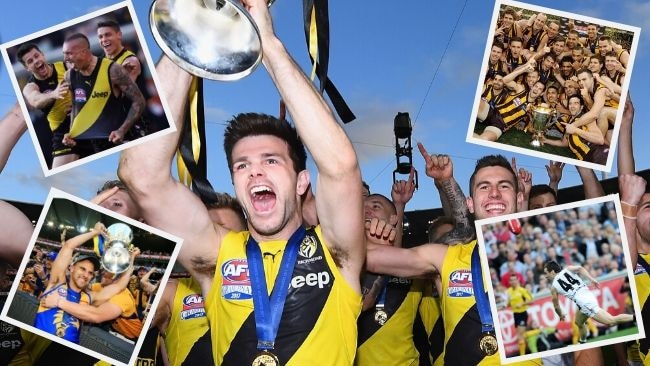
Sport
Don't miss out on the headlines from Sport. Followed categories will be added to My News.
Get ready to select the best team of the past decade.
Not by us at the Herald Sun, but by you, the fans who have a keen sense of greatness.
We have ranked teams from 1-32 in a competition to select the most formidable team from 2010 to end of 2019.
We’ll have match-ups that pit, for example, Collingwood’s 2018 Grand Final team against West Coast’s 2015 Grand Final side, and Hawthorn’s losing GF outfit in 2012 against Fremantle’s s losing GF team in 2013.
So, let the voting begin.
HAVEN’T VOTED ON PART 1? CLICK HERE
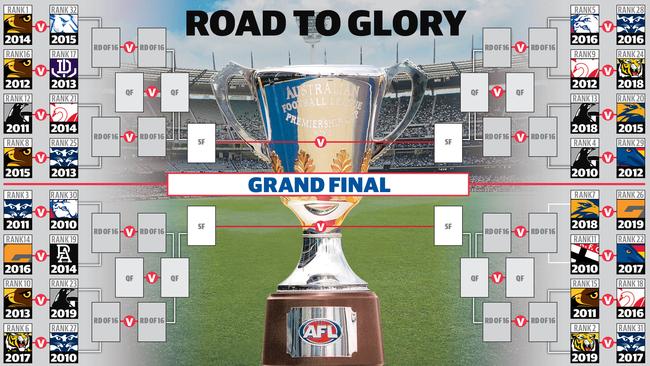
GREATEST TEAM OF THE DECADE
MATCH 1: RICHMOND 2019 V GEELONG 2017
RICHMOND 2019 (No. 2 seed)
Coach: Damien Hardwick
Captain: Trent Cotchin
Won: 19 Lost: 6
Premiers
KEY STATS
Ranked No. 2 for points scored and No. 3 for points against.
Ranked No. 1 for points scored from turnovers, No. 3 points against from turnovers and No. 1 points differential from turnovers.
Ranked No. 2 for inside 50 differential and No. 3 for time in forward half differential.
STRENGTH
The final three months of the season were, in a word, perfect. The 89-point Grand Final annihilation of Greater Western Sydney exemplified the gap Richmond had on the rest of the league. Dominant in all phases of the game and yet they had the chutzpah to hand Marlion Pickett a debut in the biggest game of all. The Tigers celebrated the VFL premiership a week before the AFL one and also signed up 100,000 members. Norm Smith Medal winner Dustin Martin booted four goals in the Grand Final and six majors as the Tigers stormed the Gabba in the qualifying final. But his season went unnoticed by All-Australian selectors. Defenders Bachar Houli and Dylan Grimes were the only Tigers in the team of the year, highlighting their squad mentality.
Relive classic AFL matches from the 60s to today on KAYO SPORTS. New to Kayo? Get your 14-day free trial & start streaming instantly~
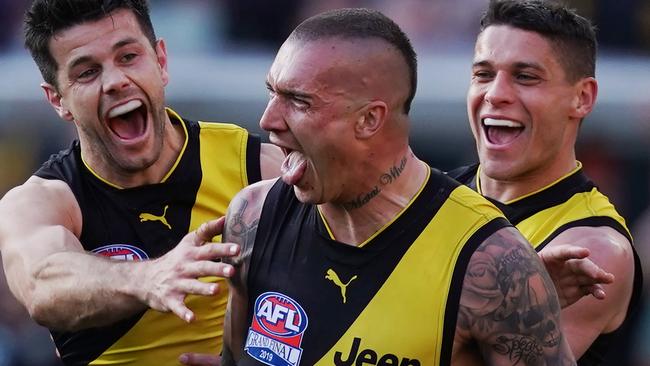
WEAKNESS
Lost Alex Rance to a season-ending knee injury in Round 1 as the superstars fell like dominoes. Jack Riewoldt, Trent Cotchin, Martin and Grimes also missed early games and the Tigers were 7-6 when they turned after the bye. Those challenges only hastened the development of its next crop as Sydney Stack, Jack Ross and Shai Bolton emerged as serious prospects. They trailed minor premier Geelong by 21 points at halftime in the preliminary final and then kicked eight goals to two in their only really challenge deep in the year.
GEELONG 2017 (31)
Coach: Chris Scott
Captain: Joel Selwood
Won: 16 Lost: 8 Drew: 1
Finished second on home-and-away ladder, but lost preliminary final to Adelaide by 61 points.
KEY STATS
Ranked No. 4 for points scored and No. 3 for points scored from stoppages.
Ranked No. 2 for contested possession differential and uncontested possession differential.
Ranked No. 1 for disposal efficiency differential and No. 3 for kicking efficiency differential.
STRENGTH
Stormed to a 5-0 start which included an 86-point hiding of arch rival Hawthorn on Easter Monday. The Patrick Dangerfield-Joel Selwood combination was breathtaking and both players earned All-Australian selection. Only played seven games at GMHBA Stadium and won six, including a Round 21 win against eventual premier Richmond. A proppy Dangerfield booted 5.6 from full-forward to spoil Luke Hodge’s 300th game in an epic and later marked his second season as a Cat with a second best-and-fairest. Mitch Duncan also enjoyed his best year.
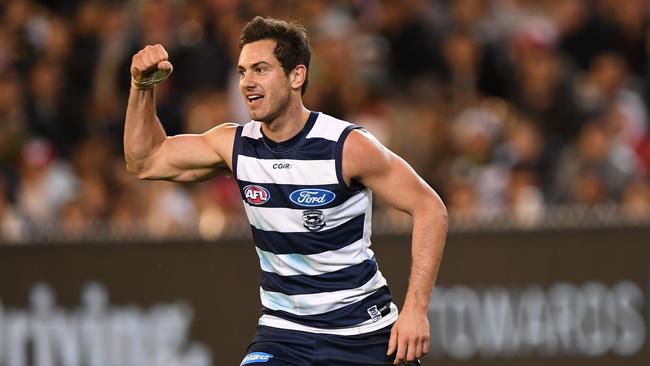
WEAKNESS
Billed as warm favourites for a qualifying final against Richmond, the Cats almost appeared spooked by the crowd of 95,028 which was largely against them. The Cats kicked just 5.10 (40) in a humbling 51-point loss — easily their smallest score for the season — and their season was effectively over by quarter-time of the preliminary final as they trailed Adelaide by 31 points at Adelaide Oval. It was a sour homecoming for Dangerfield although sandwiched between the big September defeats was a spirited win against a Sydney line-up that had won 12 of its past 13 games.
MICK McGUANE’S VERDICT
Richmond. This Tigers team is better placed than its 2017 model to beat the Cats of 2017. In that year, Tom Hawkins was crying out for some seniority around him up forward like he had enjoyed previously. At the other end of the ground, with an ageing defence the Cats had with Harry Taylor slowing up and Tom Lonergan and Andrew Mackie at the end of their careers, my argument is this: who would stop the Richmond power forwards? Who stops Dusty? Who stops Jack Riewoldt? Who goes to Tom Lynch? I question whether the Cats’ hybrid defenders could run with the Tigers’ mosquito fleet. That’s where I think the Tigers’ forward line of 2019 is too strong.
MATCH 2: WEST COAST 2018 V GWS GIANTS 2019
WEST COAST 2018 (7)
Coach: Adam Simpson
Captain: Shannon Hurn
Won: 19 Lost: 6
Premiers
KEY STATS
Ranked No. 3 for points scored, No. 4 for points against and No. 1 for goal per inside 50.
Ranked No. 3 for points scored from turnovers and points differential from turnovers.
Recorded the highest kick-to-handball ratio of any side and took the most marks in the competition.
STRENGTH
Lost the first ever AFL game at the new Perth Stadium and then won 11 of the following 13 to book a place in the Grand Final. The Eagles had a new House of Pain, and the MCG-sized dimensions eased the troubles travelling east. In fact, the Eagles went 5-0 in Victoria in 2018 to graduate from hometown bullies to everywhere kings. Adam Simpson’s coaching was widely lauded as he set up the “Weagles Web” as the likes of Jeremy McGovern and Shannon Hurn picked off entries with ease. In fact, McGovern’s decision to leave Jordan De Goey to intercept Adam Treloar’s kick late in the Grand Final set up the most glorious play in West Coast history as the Eagles attacked down the wing to set up Dom Sheed’s magical matchwinning goal.
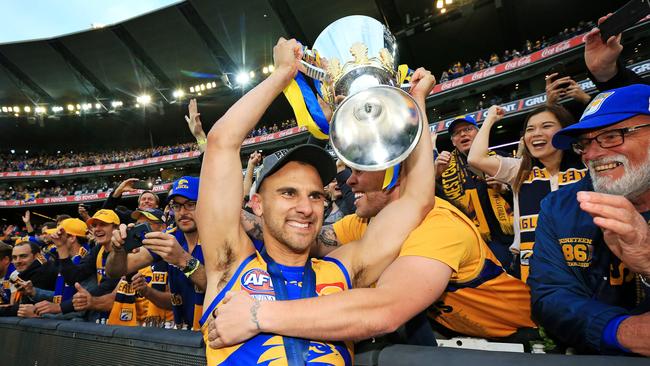
WEAKNESS
The Eagles trailed Collingwood 0.2 (2) to 5.0 (30) just 22 minutes into the Grand Final and were without three stars — Andrew Gaff (suspended), Nic Naitanui (knee) and the underrated Brad Sheppard (hamstring). The resilience to fight back both on Grand Final day and from those key outs highlighted the new-found resilience. Former Cat Nathan Vardy stepped up to replace Nic Nat, Will Schofield took Sheppard’s place and Sheed assumed more midfield responsibility in place of Gaff. Speculation that Gaff — who clocked Fremantle’s Andrew Brayshaw in an out-of-character brain explosion that cost him an eight-match suspension — would join North Melbourne also lingered, but he put pen to paper after the Grand Final. McGovern also turned down a godfather offer from Fremantle to re-sign.
GWS GIANTS 2019 (26)
Coach: Leon Cameron
Captain: Phil Davis
Won: 16. Lost: 10.
Made it to the Grand Final from sixth, but collapsed against Richmond and lost title decider by 89 points.
KEY STATS
Ranked No. 5 for points against and No. 1 for conceding a score from an opposition inside 50.
Ranked No. 2 for clearance differential and No. 3 for points differential from stoppages.
Ranked No. 2 for contested possession differential and No. 1 for uncontested possession differential.
STRENGTH
Villain Toby Greene and his Giants emerged as the story of September as the club surged from sixth into the Grand Final with three stunning victories underpinned by ferocious aggression. They bullied the baby Bulldogs in the elimination final and then knocked the Brisbane Lions out in straight sets with an epic victory at the Gabba. The boilover against Collingwood in the preliminary final was the club’s greatest win in its history, holding on at a wet MCG despite the Magpies booting the final 4.5 (29). Injured superstar Stephen Coniglio delivered a pre-finals boost to the club by recommitting for seven seasons while Jeremy Cameron’s 9.5 in Round 23 pinched the Coleman Medal.
WEAKNESS
The Giants lost co-captain Callan Ward to a season-ending knee injury in Round 4 and the blows kept on coming, and yet they kept on fighting on. Knee injuries ended Coniglio and Jon Patton’s season early and while Greene escaped a suspension for making contact to Marcus Bontempelli’s face in the elimination final, lightning did not strike twice. The tribunal — and subsequent appeal — rubbed Greene out of the preliminary final for an incident with Lachie Neale. While Greene returned for the Grand Final, Lachie Whitfield played just days after having his appendix removed and Phil Davis underwent a pre-game fitness test. The Giants were banged-up and lost by 89 points, but it was still a September to remember as anyone who doubted Leon Cameron’s coaching was silenced.
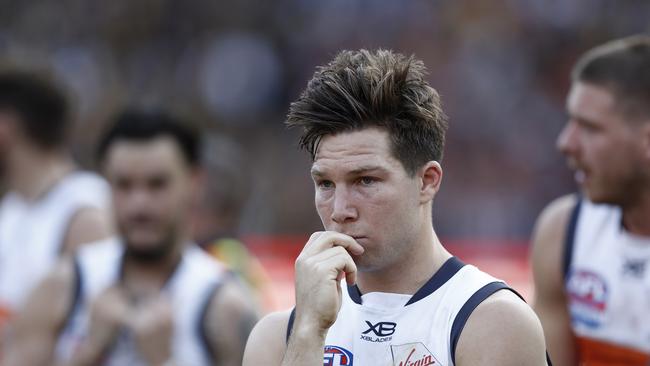
MICK McGUANE’S VERDICT
West Coast. Both sides loved to play keepings off and to possess the footy at all times. Both loved to kick-mark, be the first to register 90 marks for a game and get the win. The Eagles were really effective with their ball use and they usually ended up with more inside 50s than their opponent, whereas the Giants struggled in that area. Both teams could score and were even in terms of defence. I’ve picked the Eagles because they had the best turnover game in the league. Their ability to score post turnover was more efficient than the Giants.
MATCH 3: ST KILDA 2010 V ADELAIDE 2017
ST KILDA 2010 (11)
Coach: Ross Lyon
Captain: Nick Riewoldt
Won: 17 Lost: 7 Drew: 2
Was third after the regular season. Drew the Grand Final with Collingwood, but lost the replay by 56 points.
KEY STATS
Ranked No. 1 for points against, and No. 2 for opposition score per inside 50 and points against from turnovers.
Ranked No. 3 for disposal, uncontested possession and tackle differentials.
Ranked No. 4 for turnovers created in the forward half.
STRENGTH
Rebounded from the heartbreak of a wasteful 2009 Grand Final to again content for the premiership and break off-field records. The Saints recorded 40,000 members for the first time, set record home-and-away crowds against Geelong and Hawthorn and played in front of a club-record 81,836 against Collingwood. All eyes were on Ross Lyon’s Saints and they also recorded record wins against Port Adelaide (94 points) and North Melbourne (104) as they played with a dash more flair. Extracted revenge against the Cats with an epic qualifying final victory and then Brendon Goddard’s speccy in the Grand Final saw the Saints push a goal clear of Collingwood approaching time-on in the final quarter. They were one cruel bounce away from breaking their premiership drought.
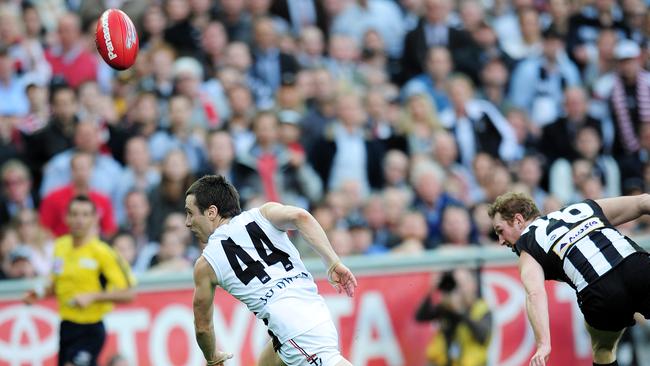
WEAKNESS
If Ross Lyon had his time over he would’ve done things differently in the moments after the drawn Grand Final, where flooded changerooms and immediate uncertainty over how to handle the week contributed to the Saints running out of gas. Just as Goddard’s high-flying mark typified the Grand Final draw, Heath Shaw smother as Nick Riewoldt ran into an open goal typified the replay as the Saints lost by 56 points. St Kilda had a bottom few of Zac Dawson, Andrew McQualter, Brett Peake, Robert Eddy and Jason Blake and yet somehow they won 39 games in two seasons. Still, there was no premiership.
ADELAIDE 2017 (22)
Coach: Don Pyke
Captain: Taylor Walker
Won: 17. Lost: 7. Drew: 1.
Sat atop the ladder on percentage after home-and-away season. Lost Grand Final to Richmond by eight goals.
KEY STATS
Ranked No. 1 for points scored, goal per inside 50 and No. 2 for score per inside 50.
Ranked No. 1 for points scored from turnovers and points differential from turnovers.
Ranked No. 3 for turnovers created in the forward half and No. 1 for points scored from these turnovers.
STRENGTH
The AFL’s No. 1 offensive team — and one of the more potent attacks in recent times. After Round 6 the Crows were 6-0 with scores of 147, 113, 100, 153, 153 and 140 and premiership favourites. Once known as the dour “CrowBots”, a forward line boasting Taylor Walker, Josh Jenkins, Eddie Betts and Tom Lynch left defenders in cold sweats and their slick ball movement looked unstoppable at times. The Crows were so dominant they had eight players make the All-Australian squad of 40 – Betts, Matt Crouch, Sam Jacobs, Rory Laird, Jake Lever, Lynch, Rory Sloane and Walker. Pummelled GWS and Geelong at home to reach their third Grand Final.
WEAKNESS
It appeared they had few weaknesses until the yips arrived at quarter-time on Grand Final day. The Crows led by 13 points and then conceded 14 of the final 18 goals and that triggered the imploding of a club. Walker led Adelaide’s power stance during the national anthem in the finals and that became a mockery. Then Jake Lever walked out on the club amid reports he was uninvited from the best-and-fairest. Walker took aim at him publicly and then Adelaide embarked on that infamous pre-season camp which helped derail the next two seasons.
MARK ROBINSON’S VERDICT
Saints easy. The 2009-10 St Kilda was desperately unlucky not to win consecutive flags. It boasted an abundance of top-end performers — Nick Riewoldt, Lenny Hayes, Brendon Goddard, Stephen Milne, Leigh Montagna, Sam Fisher and Nick Dal Santo — and a host of devoted role players. The club was coached superbly by Ross Lyon. The Crows smashed GWS and Geelong at Adelaide Oval in their first two finals in 2017 and were then trounced by Richmond in the Grand Final. The Saints in 2010 were a machine and do not get the accolades they deserve despite not winning the flag.
MATCH 4: HAWTHORN 2011 V SYDNEY 2016
HAWTHORN 2011 (15)
Coach: Alastair Clarkson
Captain: Luke Hodge
Won: 19 Lost: 6
Was third before finals. Lost preliminary final to Collingwood by just three points.
KEY STATS
Ranked No. 3 for points against, points against from stoppages and points against from turnovers.
Ranked No. 3 for points scored and points from turnovers.
Ranked No. 1 for disposal differential, uncontested possession differential and disposal efficiency differential.
STRENGTH
After two seasons in the wilderness the Hawks, finally, re-emerged as a premiership threat. They had not won a final since that shock 2008 flag and yet they looked like a top-four team all season long. Sam Mitchell won the third of his five best-and-fairests and Lance Franklin booted 82 goals, which remains his second-best return behind the century in 2008. Franklin was consistent, kicking at least two goals in 20 out of 22 games while defenders Grant Birchall and Josh Gibson also made the All-Australian squad of 40.
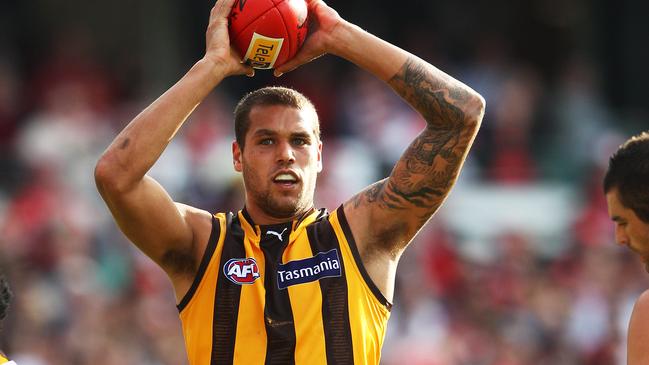
WEAKNESS
Jarryd Roughead was reborn as a ruckman-forward in 2011 although in Round 12 he ruptured his Achilles against Geelong and was carried from the field on a stretcher, his season finished. Still, Hawthorn stayed on the premiership course and always looked like beating Collingwood in the 2011 preliminary final. Franklin’s ridiculous banana goal to reclaim the lead in time-on looked set to secure the victory, but Luke Ball — not notably a goalkicker or long kicker — somehow snapped a 35m left-foot goal to end Hawthorn’s season.
SYDNEY 2016 (18)
Coach: John Longmire
Captains: Kieren Jack & Jarrad McVeigh
Won: 19 Lost: 7
Was minor premier on percentage, but lost Grand Final to Western Bulldogs by 22 points.
KEY STATS
Ranked No. 1 for points against, opposition score per inside 50 and points against from stoppages.
Ranked No. 4 for points scored, No. 2 for points scored from stoppages and points differential from stoppages.
Ranked No. 3 for contested possession differential and No. 4 for disposal differential.
STRENGTH
This was Sydney’s most dominant home-and-away season in a century. The minor premier lost just five games, and four of those were by 10 points or less, and seven wins were by 10 goals or more. The Swans delivered five All-Australians — Dane Rampe, Dan Hannebery, Josh Kennedy, Lance Franklin and Luke Parker, who finished runner-up in the Brownlow Medal. In Round 9 they defeated Hawthorn, winner of the past three premierships, at the MCG and in Round 16 they smacked Geelong by 38 points under the Friday night lights at GMHBA Stadium in Kieren Jack’s 200th game. They never lost consecutive games and entered the finals on the back of 113-point win against Richmond in which Franklin slotted 7.4.
WEAKNESS
Sydney only really stuttered in September. The AFL introduced the pre-finals bye and denied the Swans a home qualifying final by instead fixturing their clash against Greater Western Sydney at ANZ Stadium, which would be the last Australian rules game at the venue. A shock loss put Sydney on the long road to the Grand Final, but comfortable wins against Adelaide and Geelong restored premiership favouritism. The Swans led by 25 and 37 points at quarter-time respectively in those finals, although they lost defender Aliir Aliir (knee) in the preliminary final. But the Western Bulldogs had been their bogy team — coach Luke Beveridge won his first four games against Sydney — and the Grand Final script played out in fairytale fashion for the Dogs. Franklin injured his ankle in the first quarter and Hannebery suffered a nasty knee injury in the last quarter, however both battled on bravely. Coach John Longmire fumed at the 20-8 free kick count and the next day Tom Mitchell asked for a trade to Hawthorn.
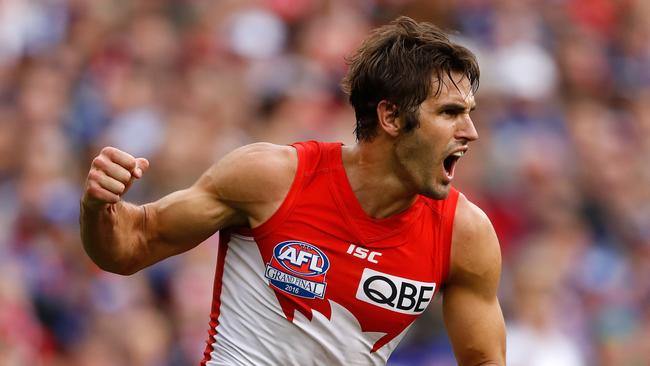
MARK ROBINSON’S VERDICT
The Hawks win this one. What a brilliant 2016 from the Swans. Finished the home-and-away rounds on top of the ladder with a percentage of 151.2. They then lost their first final to the Giants, but still fought their way into the Grand Final, where they were on the wrong side of the Cinderella story. The Hawks, meanwhile, played off in a classic preliminary final against Collingwood. Franklin kicked the inside-out dribble goal to put the Hawks in front before Luke Ball snapped the winner for the Pies. Collingwood could have beaten the Cats the next week, too. Am a bit in love with the 2011 preliminary final game, so it’s Hawks for me.
MATCH 5: GEELONG 2011 V WESTERN BULLDOGS 2010
GEELONG 2011 (3)
Coach: Chris Scott
Captain: Cameron Ling
Won: 22 Lost: 3
Premiers
KEY STATS
Ranked No. 1 for points scored, points from turnovers and goals per inside 50.
Ranked No. 2 for points against, No. 1 points against from stoppages and No. 3 for conceding a score from an opposition inside 50.
Ranked No. 3 for both contested and uncontested possession differential and No. 1 for inside 50 differential.
STRENGTH
How can a team lose its best player (Gary Ablett) and a two-time premiership coach (Mark Thompson) yet still win the next flag on offer? Geelong did all that — and more — in a remarkable 2011 season. Freshened up by first-time coach Chris Scott (who won his first 13 games in charge), the club retained the bulk of its 2007 and 2009 premiership-winning line-ups, including Joel Selwood, Jimmy Bartel, Steve Johnson, Corey Enright, Cameron Ling, Matthew Scarlett and Joel Corey, to name a few. The Cats didn’t just beat teams — they torched them. In consecutive weeks, they accounted for Melbourne (186 points) and Gold Coast (150) by a collective 56 goals — the highest-ever in successive games in VFL/AFL history. They won each of their finals by five goals or more and were the only team to beat a red-hot Collingwood all season.
WEAKNESS
Hard to pinpoint weaknesses or low points, except the end of the club’s record streak of wins down the highway. The Cats’ 29-game streak at Kardinia Park came to an end in Round 20 when the Swans produced a stunning 13-point upset. All three of Geelong’s losses came by 13 points or less. The loss of Daniel Menzel — to his first knee injury — hurt the club in the first final. The Cats trailed the Magpies in the Grand Final by three goals early in the second term and lost James Podsiadly during the course of the game, but 23-year-old Tom Hawkins came of age and Scott’s team pulled away in style in the final term.
WESTERN BULLDOGS 2010 (30)
Coach: Rodney Eade
Captain: Brad Johnson
Won: 15 Lost: 10
Finished fourth on home-and-away ladder and lost preliminary final to St Kilda by four goals.
KEY STATS
Ranked No. 5 for point scored and points from turnovers.
Ranked No. 1 for clearance differential and No. 2 for points from stoppages differential.
Ranked No. 4 for contested possession differential and disposal differential.
STRENGTH
Boosted by recruit Barry Hall (who kicked 80 goals for the season), the Western Bulldogs were a potent force in 2010. Ryan Griffen elevated his game to win his first best and fairest, Matthew Boyd polled 20 Brownlow votes and Brian Lake was All-Australian fullback. A clutch of five consecutive wins from Rounds 15-19 (by an average of 53 points) gave hope of the club ending a long Grand Final drought. That looked almost within reach when the Dogs led the Saints by a goal at halftime of the preliminary final.
WEAKNESS
Preliminary-it is struck the Bulldogs for a third consecutive year. Just when they looked ready to advance to their first premiership playoff since 1961, the Saints stopped them in their tracks with a seven-goal third term. In six attempts to knock off the top-three sides in 2010 (Collingwood, St Kilda and Geelong) the Bulldogs couldn’t manage one win, which showed they lacked the killer punch required. The sacking of Jason Akermanis late in the season created waves internally and put an external focus on the club. A fit and firing “Aker” might have made the difference if things had been different, but it wasn’t to be.
MICK McGUANE’S VERDICT
Geelong. This contest would come down to the Bulldogs’ defence up against Geelong’s attack. Geelong had plenty of avenues to score with James Podsiadly, Paul Chapman, Tom Hawkins and Steve Johnson lurking. There are plenty of questions here. Would Ryan Hargraves go to Johnson? Does Tom Williams or Dale Morris go up against Podsiadly? Or is Morris undersized and is he better off playing on Stevie J or Paul Chapman? And don’t forget Trent West, as he started on the ground as another tall in the 2011 Grand Final. Where does that leave a 21-year-old Easton Wood? Brian Lake would certainly go to Hawkins. The strength of the Cats in their premiership year was their scores from stoppages and they were elite at punishing turnovers. Their pressure was underrated as well, so the Cats win this in a thriller.
MATCH 6: RICHMOND 2017 V GEELONG 2010
RICHMOND, 2017 (6)
Coach: Damien Hardwick
Captain: Trent Cotchin
Won: 18 Lost: 7
Premiers
KEY STATS
Ranked No. 1 for points against, points against from turnovers and for conceding a score from an opposition inside 50.
Ranked No. 2 for time in forward half, No. 1 for forward half turnovers created and No. 3 for points scored from these turnovers.
Ranked No. 4 for pressure applied and for pressure applied in the forward half.
STRENGTH
Invention is the mother of necessity and that sums up Richmond’s extraordinary 2017 drought-breaking premiership. Everyone at the club was under siege heading into the season, especially coach Damien Hardwick and skipper Trent Cotchin. They ended it as the competition’s benchmark. The Tigers unveiled a unique forward line build on pressure, with one tall in Jack Riewoldt surrounded by a swarm of smaller players. The arrival of Dion Prestia, Toby Nankervis and Josh Caddy made a huge difference, and Dustin Martin transformed himself into the best player in the game. He also attracted multimillion-dollar offers from rival clubs before he opted to stay. A refined game plan, a harder mental edge and a care and belief in each other made the Tigers compelling viewing.
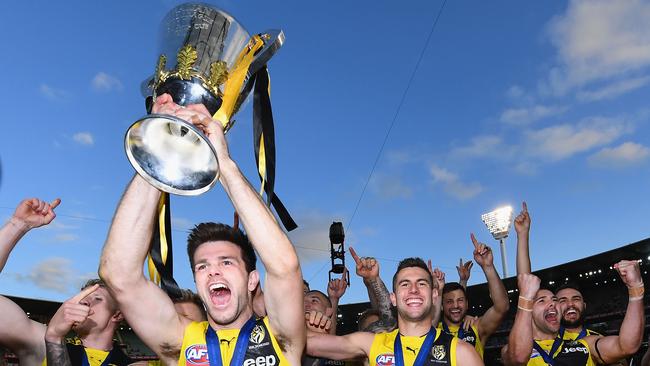
WEAKNESS
Hard to believe a string of heartbreaking close losses — three by less than a goal in consecutive weeks from Rounds 7-9 — cast more doubt on the Tigers’ toughness. The most vulnerable Richmond looked all season came in Round 16 when St Kilda put on a clinic — the Saints led 14.8 (92) to 1.4 (10) at halftime. The final margin was 67 points and the doubters had more ammunition. Adelaide went into the Grand Final as favourite, but not even the Crows’ “Power Stance’ could save them from a rampant Richmond which was intent on winning its first flag in 37 years.
MORE AFL NEWS:
AFL greatest team of the decade: You decide the best team since 2010
The Tackle: We miss so much about footy but what we miss most is connection to each other
GEELONG, 2010 (27)
Coach: Mark Thompson
Captain: Cameron Ling
Won: 18 Lost: 7
Sat second on the home-and-away ladder but lost preliminary final to Collingwood by 41 points.
KEY STATS
Ranked No. 1 for points scored, score per inside 50 and goal per inside 50.
Ranked No. 2 for points differential from turnovers and No. 1 for points differential from stoppages.
Ranked No. 1 disposal differential, uncontested possession differential and No. 2 for contested possession differential.
STRENGTH
The reigning premiers had their usual array of superstars still available, even if the side didn’t look as cohesive as previous years. Locked into the top two from Round 7 until the end of the home-and-away season, Geelong’s dominance meant it had six All-Australians with Gary Ablett (756 disposals), Steve Johnson (63 goals), Joel Selwood (best and fairest), Corey Enright, Harry Taylor and Paul Chapman all getting the nod. At their relentless best, these Cats buried teams. Seven home-and-away wins were by 10 goals or more — with their 108-point win over Richmond and 101-point demolition of the Bulldogs the most brutal.
WEAKNESS
A schism between Ablett and Mark Thompson created unwanted tension. Ablett was mulling over a multi-million offer from Gold Coast; Thompson was trying to ensure the Cats’ salary cap didn’t blow up. Thompson feared the Cats were getting stale with his voice after so many years in the role. He left at the end of the season, as did Ablett. Geelong knocked off Collingwood in Round 9, but couldn’t get close to the Magpies when it mattered. The Cats almost knocked off the Saints in the qualifying final but heartbreakingly missed out in the dying moments of the game, a lethal blow to their flag hopes.
MICK McGUANE’S VERDICT
Geelong. Another controversial one, but I’m going with the Cats here. In the 2017 finals series, no team could stand up to Richmond’s heat. The 2010 Cats were probably the best team in it that year and Collingwood’s pressure denied them from getting into the Grand Final. This is where the contradiction might be because if Geelong succumbed to Collingwood’s pressure, why wouldn’t it succumb to Richmond’s? That’s a fair argument, but they had the personnel to trouble the Tigers. Geelong’s ability to score, from both stoppages and intercepts, would really challenge the Tigers structurally. As good as that Richmond backline was, including their general Alex Rance, I’ve got no doubt it would be vertically challenged here. Who tags Dustin Martin? Cameron Ling in midfield and then Matthew Scarlett when he pushes forward.
MATCH 7: HAWTHORN 2013 V COLLINGWOOD 2019
HAWTHORN, 2013 (10)
Coach: Alastair Clarkson
Captain: Luke Hodge
Won: 22 Lost: 3
Premiers
KEY STATS
Ranked No. 1 for points scored and points from stoppages, and No. 2 for goals per inside 50.
Ranked No. 3 for points scored from turnovers and No. 2 for points differential from turnovers.
Ranked No. 2 for disposal differential, uncontested possession differential and inside 50 differential.
STRENGTH
The pain of the previous year’s Grand Final loss, the recruitment of a key defender and the blending of one-time premiership heroes with a group of younger players made the 2013 Hawks a powerful force. Brian Lake won the Norm Smith Medal and also released the shackles on best-and-fairest winner Josh Gibson. Jarryd Roughead won the Coleman Medal, Sam Mitchell was unstoppable and the leadership of Luke Hodge and Alastair Clarkson was invaluable. Clarkson anticipated the impending departure of Lance Franklin at season’s end by making the club less reliant on him as an avenue to goal. After losing to Geelong (again) in Round 1, the Hawks reeled off 12 consecutive wins (equal to the club record in 1961) before the Cats struck again in Round 15.
WEAKNESS
The spectre of Geelong hung over Hawthorn in the years after the 2008 premiership, thanks to the “Kennett Curse”. Break it and the Hawks might unlock the chains that bound them. A seven-point loss and a 10-point loss to their nemesis in the 2011 regular season only added to the pain. Then a loss to Richmond by 41 points in Round 19 made the Hawks look vulnerable. As it turned out, those would be the only losses the Hawks had in a season that started the flag three-peat. A nail-bitter ensued in the preliminary final. A late miss from Geelong’s Travis Varcoe helped send the Hawks into the Grand Final and ultimately a trophy-clinching win over Fremantle.
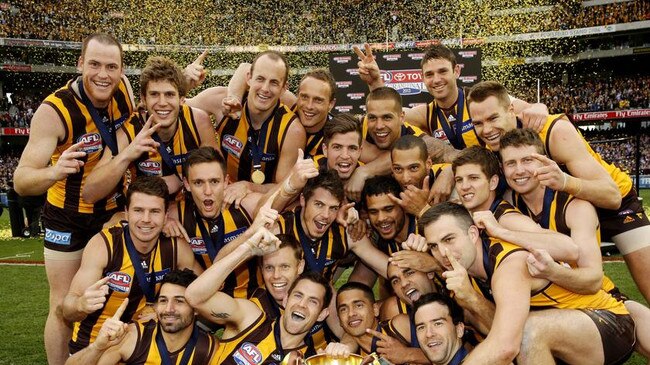
COLLINGWOOD, 2019 (23)
Coach: Nathan Buckley
Captain: Scott Pendlebury
Won: 16 Lost: 8
Placed fourth after home-and-away rounds and lost preliminary final to the Giants by four points.
KEY STATS
Ranked No. 2 for points against and No. 3 for conceding a score from an opposition inside 50.
Ranked No. 4 for points differential from both turnovers and stoppages.
Ranked No. 1 for disposal differential, No. 4 for contested possession differential and No. 2 for uncontested possession differential.
STRENGTH
Collingwood loomed as Richmond’s greatest threat, knocking off the Tigers by 44 points in Round 2 before streaking to a 10-3 start to the season. Jordan Roughead proved a bargain pick-up from the Dogs while Dayne Beams faced challenges in his return. Brodie Grundy elevated his game to a new level, the midfield shone, while Darcy Moore and Jamie Elliott slowly but surely managed to overcome injury issues. In an even season, the Magpies strode into the finals off the back of four successive wins, then touched up minors premiers Geelong in a hard-fought qualifying final to push into a preliminary final.
WEAKNESS
A great season was ruined by some unsettling injuries and off-field issues as well as a half-hour lapse which cost them dearly. Young gun Jaidyn Stephenson copped a 10-match suspension for a gambling indiscretion and Beams’ season ended prematurely due to injury and mental health issues. Other injuries to Mason Cox, Jordan De Goey, Adam Treloar, Taylor Adams and Tom Langdon impacted at different times. The team failed to adapt to the rain in the preliminary final against an undermanned GWS. The Pies also failed to capitalise on Grundy’s ruck dominance as the Giants kicked 5.2 to 0.3 in the third term. The Magpies stormed home but fell four points short, leaving them to lament a wasted opportunity.
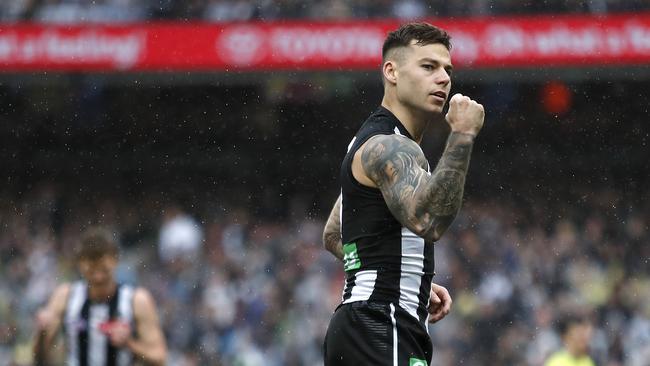
MARK ROBINSON’S VERDICT
It was the first of Hawthorn’s three-peat versus the Pies who were denied by the Giants in a preliminary final slugfest. Have chosen the Hawks. Was the last year of Lance Franklin at Hawthorn and the start of a dynasty. They finished the home-and-away season on top with an imposing 19-3 record and then won the prelim by five points (Geelong) and the GF by 15 points (Fremantle). The Pies gave up a huge lead and almost stole it at the end. That loss still hurts the Pies’ organisation. Simply, the Hawks got it done and the Pies didn’t.
MATCH 8: GWS 2016 V PORT ADELAIDE 2014
GREATER WESTERN SYDNEY, 2016 (14)
Coach: Leon Cameron
Captain: Phil Davis, Callan Ward
Won: 17 Lost: 7
Was fourth on home-and-away ladder then lost epic preliminary final to the Western Bulldogs in Sydney by a goal.
KEY STATS
Ranked No. 2 for points scored and No. 3 for generating a score once inside 50.
Ranked No. 2 for clearance differential and No. 1 for points scored from stoppages.
Ranked No. 4 for contested and uncontested possession differential.
STRENGTH
All the hard work in drafting some of the best kids in the land and retaining most of them paid off with the club’s first finals appearance and its most wins in a season (17). Leon Cameron turned the “Orange Tsunami” into a contested beast with a harder edge in 2016. Steve Johnson (43 goals) was a strong acquisition. Toby Greene, Stephen Coniglio, Josh Kelly, Tom Scully, Heath Shaw and Zac Williams were outstanding. Phil Davis and Callan Ward led from the front. Six straight wins came from Rounds 4-9, including an 83-point thumping of reigning premier Hawthorn. But their most telling performance was a six-goal qualifying final crunching of minor premier Sydney.
WEAKNESS
Steve Johnson’s outstanding first season with the Giants hit a massive hurdle when he was suspended for a match after he collected Swan Josh Kennedy high in the first final. It cost him a spot in the preliminary final against the Western Bulldogs, who were shaping as the AFL’s fairytale team. The Giants sorely missed Stevie J’s presence, uncanny goal sense and finals experience. The two young sides slugged it out over four quarters — the Giants’ last three shots at goal were behinds as the Bulldogs held on to win by six points. The Giants lamented what might have been a week later when the Bulldogs won the flag.
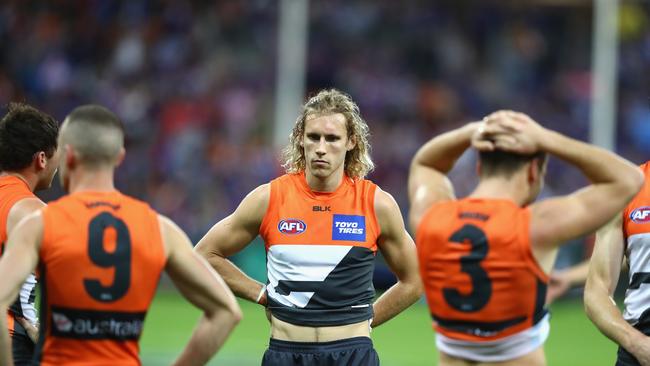
PORT ADELAIDE, 2014 (19)
Coach: Ken Hinkley
Captain: Travis Boak
Won: 16 Lost: 9
Placed fifth after home-and-away rounds. Two huge finals wins against Richmond and Fremantle preceded a three-point preliminary final loss to Hawthorn.
KEY STATS
Ranked No. 1 for inside 50 differential and time in forward half differential
Ranked No. 2 for points scored, points from stoppages and No. 4 for points scored from turnovers
Ranked No. 4 for disposal and contested possession differentials
STRENGTH
Ken Hinkley’s second season at the helm delivered in spades as he brought together a group capable of beating the best. Port Adelaide stormed to the top of the ladder by Round 6 after it beat Geelong — a position it maintained for a large part of the season, courtesy of eight straight wins. Power players won mark of the year (Chad Wingard) and goal of the year (Matt White). Big finals wins over Richmond and Fremantle (at Subiaco) put the club into a preliminary final with Hawthorn that went down to the wire.

WEAKNESS
The Power lost six of their last nine games of the home-and-away season which blew any hopes of a double chance. The heartbreaking nature of the three-point preliminary final loss cut deep. Inaccuracy cost the Power heavily in that MCG clash — they kicked 13.16 (94) to the Hawks’ 15.7 (97). A wasteful first quarter yielded 3.9 and left the door ajar for the more efficient Hawks and the Power have never been as deep in the finals since.
MARK ROBINSON’S VERDICT
What a match-up this is. People reckon the 2016 preliminary final between the Giants and the Dogs was one of the best games of the past 50 years and Port Adelaide’s loss to Hawthorn in 2014 at the MCG was also a nailbiter. The Hawks’ team that year is the No. 1 seed in this competition and Port kicked 5.3 to 2.1 in the final quarter to almost pinch a Grand Final berth. It was super effort, Still, the Giants of ’16 were something else, although they are still ruing giving up a home preliminary final. This is tight, but slightly favour the Giants.
Originally published as AFL greatest team of the decade: You decide the best team since 2010


